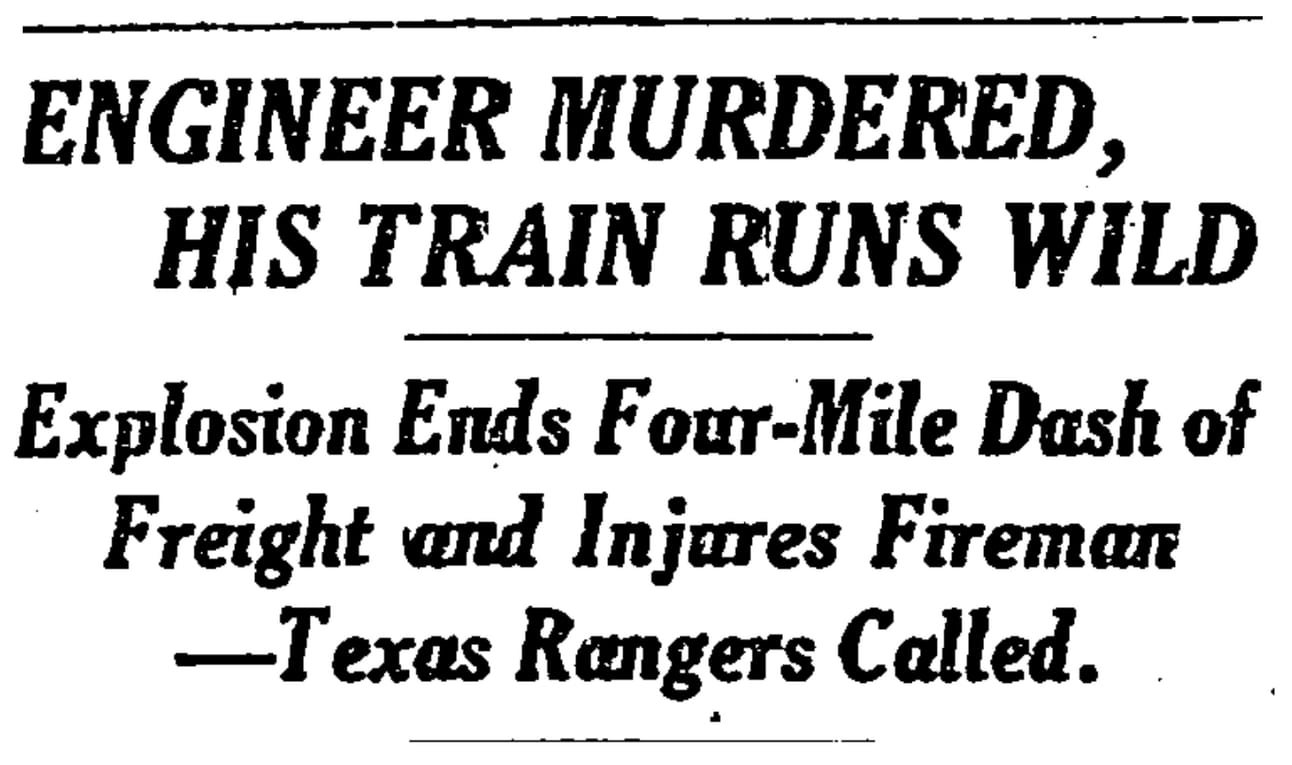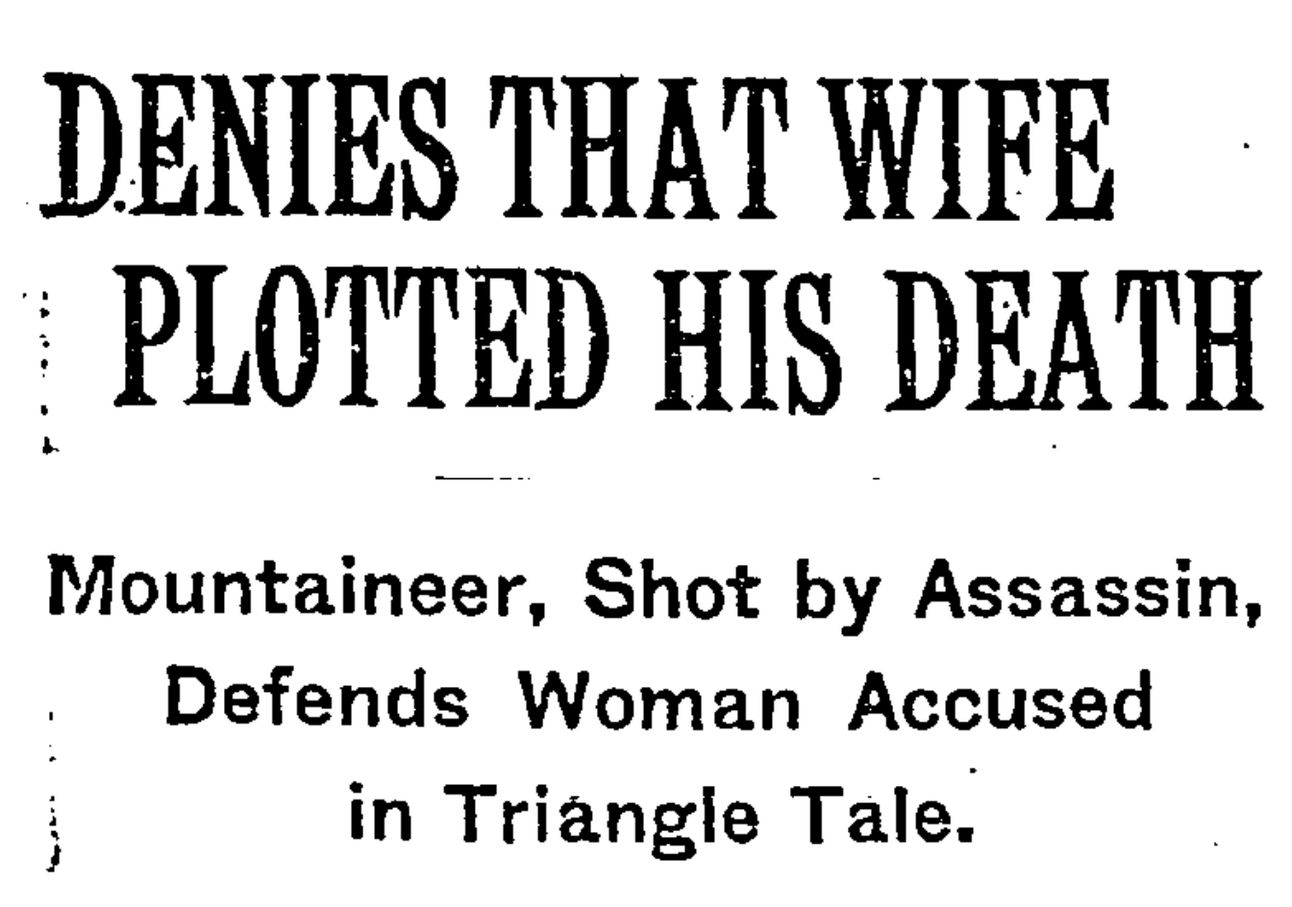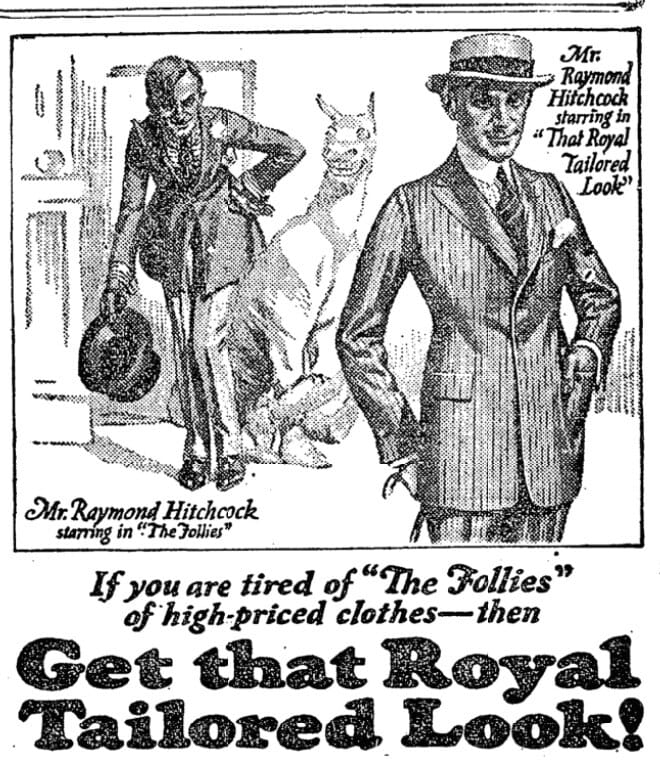- Strange Times
- Posts
- Strange Times 190: One Gunman, Much Booze
Strange Times 190: One Gunman, Much Booze
This week on I’ll Watch Anything, the movie podcast with a sense of optimism, Henry and I have an absolutely wonderful time with the truly ridiculous 1953 House of Wax, a Vincent Price vehicle that was originally shot in 3D and features all kinds of silly 3D nonsense. Listen here or on Spotify, Apple Podcasts, or the app of your choice.

Today we have flaming crows, wild locomotives, boozy bandits and Ramapomerta. Explode into a ball of airborne fire on…
July 9, 1921
Éamon de Valera and Lloyd George agree to a truce between England and Ireland, the first step—they hope—toward the negotiation of a peace between the two nations.
At the closing of the Congress of the Third International, it is believed that the factions of Lenin and Trotsky have patched up their differences, with prominent Bolsheviks Radek, Zinoviev, and Bukharin all agreeing that while within Russia Communism’s principles may be bent, they must not be altered even slightly in countries not controlled by the proletariat. Aside from Lenin, everyone mentioned in this article will later be murdered by Stalin.
Denying that he is an occultist, English scientist John Russ announces the discovery of an invisible force controlled by the human eye, which has the power to move objects from across the room.
In Cleveland, witnesses testify that Mrs. Kaber offered $3,000 to anyone who would run her husband over with a car.
Caruso denies reports that his voice has been destroyed by his recent illness, insisting that he will return to the stage when he sees fit.
The Weather: Local showers today; Sunday fair; little change in temperature; moderate south and west winds.

Yeesh. The poor bird!
ROCHESTER, N.Y., July 8.—A crow alighted on a heavily charged electric wire of the Niagara Power Company yesterday and was instantly electrocuted, falling a blazing mass into a field of uncut hay belonging to Hobart Stahl, near Spencerport, eight miles from here.
The field caught fire, causing a loss of several hundred dollars, and for a time threatened adjoining wheat fields, whose uncut crops are estimated to be worth several thousands. The Spencerport Chemical Company made the three mile run to the Stahl place and prevented further damage.

This story is baffling. I first stumbled over the usage of the archaic “advices” to mean “news.” I’ve been reading this newspaper for 7 years now and I don’t think I’ve ever seen that—here it’s used twice. Next there’s the way that they mention the murder almost in passing, spend most of the article talking about what happened to the train, and then casually mention that the company suspects foul play. It doesn’t take Hercule Poirot to know that murders are usually signs of foul play!
EL PASO, Texas, July 8.—Engineer William Bohman of Sanderson, Texas, was murdered and thrown from his train near Alpine, Texas, today, according to advices received at the local office of the Galveston, Harrisburg & San Antonio Railway.
After four miles of uncontrolled speeding the boiler of the engine of the freight train blew up, seriously injuring the fireman, Charles Robertson of Valentine, Texas.
The train was wrecked ten miles west of Alpine.
Bohman’s body was found four miles back of where the explosion occurred, advices from Alpine stated.
Bohman was attacked while his fireman was busy raising steam for a grade, the fireman not noticing the engineer was missing and the locomotive unattended.
The explosion blew the boiler and engine about thirty feet and the cab about 200 yards.
A Texas Ranger has been ordered to Valentine, Jeff Davis County, to investigate the death of Engineer Bohman and the injury of Foreman Robertson.
Adjt. Gen. Barton of Texas announced that this action was taken on request of Southern Pacific Railroad officials, who said that foul play was responsible for the explosion.

1,175 quarts! Back of the envelope math suggest that would weigh around 2500 pounds. Unless “car” means “truck,” that is a seriously overloaded auto! The police could have caught it at a walking pace, I suspect. Perhaps then they’d have been tired enough to spare their prisoner the clubs.
HOULTON, Me., July 8.—A revolver duel between two alleged liquor smugglers in an automobile and a posse of deputy sheriffs at Monticello today resulted in the capture of one man. Twenty-one shots were fired by the officers, while the pistols of the fugitives were apparently emptied.
The deputies were forced to use clubs in subduing their sole prisoner. He gave his name as William Lizzotte of Caribou. The seized car contained 1,175 quarts of whisky.
Occupants of another car traveling 300 yards behind the first, hearing the shots and seeing the car stopped, turned about and fled across the Canadian border.

Folks, I’ve been to Rockland County. I had no idea how depraved it could be!
NEW CITY, N.Y., July 8.—Rockland County is listening to the unfolding before Judge Patterson in the county court here of a story of romantic crime in the fastnesses of the Ramapo range that might well have been enacted in the mountains of Kentucky or Tennessee instead of almost at the doors of the metropolis. Yet the tale, as it is pieced together bit by bit, largely from the mouths of reluctant witnesses of the true mountaineer type, is flavored with the deeds of brave men in the bitterness of last February’s storm that carry one in imagination straight to the Canadian Northwest and its mounted police.
Mrs. Lida Johnson is on trial charged with attempted murder in the first degree. Ed Rose, star boarder and farmhand at the Johnson place in a lane between Ramapo and Bear Mountains, threw up his hands in the middle of his trial for the same offense yesterday, pleaded guilty in the second degree and got a sentence of five to ten years in Sing Sing.
It was expected that the chief witness against Mrs. Johnson would be her husband, Fred. But he isn’t Fred does not want to see Rose convicted. He is doing all he can to upset the case against his wife. He regards the whole thing as a neighborhood, family affair and he shows the mountaineer’s wonted reaction to the intervention of constituted authority from a distance. In that attitude the prosecution’s own witnesses seconded him ably.
Johnson’s attitude is the more remarkable when one considers that twice he was the target of a would-be assassin who fired from ambush and that the second time three loads of buckshot took effect as he was battling his way through a snowstorm. He spent eight weeks in the Suffern Hospital, and when he came out he was told his wife and Rose had signed confessions that they had plotted his death and that Rose had admitted having fired the shots, but he was quite positive on the stand today that Rose was “just a good friend of ours” and that his wife was innocent.
It was on Feb. 18 that a rifle bullet whizzed past Johnson’s head. He ducked and went about his business, and two days later was driving a bobsled along the almost obliterated trail to his home when a shotgun belched three times, and he found himself lying sorely wounded in the piled snow that was falling faster and faster. How he dragged that gnarled 50-year-old body home is in itself an epic of grit and the will not to die.
The Rev. Dr. Burton Lee, Episcopal mountain missionary, was near Ramapo at the time. To him came ex-Captain William A. Jones, pistol expert of the New York Police Department and now head of a private detective agency, who had been summoned by the county authorities. He brought along ex-Sergeant Fogarty, who served with him in the department. It was snowing worse than ever when they arrived. But their job lay in Johnson’s cabin and they started out. It took them six hours to go a mile. They very nearly froze to death, but they got one. The case was a hard one, but Dr. Lee’s influence, it is asserted, softened Mrs. Johnson and Rose and, it is alleged by the prosecution, they signed confessions that they had begun to believe Johnson suspected their relations and had debated whether Rose should go away or kill the husband. Rose, it is charged, elected to stay with the trim-looking woman of 35 and it was decided he should kill Johnson.
In the confession Mrs. Johnson is alleged to have made she said Rose was the father of all three of her children. In his, Rose said he was the father of two of them. On the stand yesterday Johnson insisted his wife had been faithful.
Charles Blanchard, mountaineer neighbor of the three, was put on the stand by the prosecutor in the hope of showing that the alleged triangle in the cabin was common talk in the region.
“What of it?” asked Blanchard. “That’s common in the mountains, and from what I see in the newspapers I guess it’s common in the city, too.”
Blanchard’s attitude was duplicated by other witnesses, who turned a solid phalanx against the authorities, so that the State will have to rely largely upon the alleged confessions when it goes ahead with its case tomorrow.


